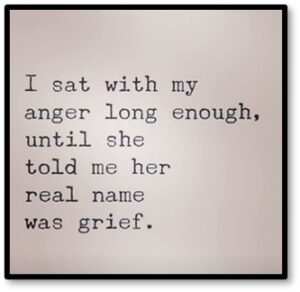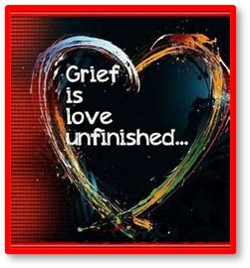Monday Author: Susanne Skinner
Grief, I’ve learned, is really just love. It’s all the love you want to give but cannot. All that unspent love gathers up in the corners of your eyes, the lump in your throat, and in that hollow part of your chest. Grief is just love with no place to go.” ~ Jamie Anderson
This highway called life has two guaranteed entrance and exit points—birth and death. We don’t choose either one, so we have no idea how long the journey will be.
 Death isn’t something we dwell on when we’re young. Our experience is limited to people like our grandparents and others of their generation. As we age, we suffer the loss of our own parents and then one day it hits us—we’re at the head of the line. We’re too young to die, yet somehow we must accept that we’re next.
Death isn’t something we dwell on when we’re young. Our experience is limited to people like our grandparents and others of their generation. As we age, we suffer the loss of our own parents and then one day it hits us—we’re at the head of the line. We’re too young to die, yet somehow we must accept that we’re next.
Lifelong friends, professional colleagues, neighbors, siblings and partners are taken from us much too soon. Though we are unprepared we find ourselves in a front row seat.
There is an empty chair at our table and emptiness inside of us filled with grief.
The Heaviness of Grief
When death comes to those we love it brings bone-crushing grief. The heaviness of a broken heart is indescribable to those who have not suffered it. Loss of that magnitude leaves a hole in our hearts and our lives. It is the hardest emotional passage we confront.
There is a heaviness to grieving and grief is not a linear process. Pain comes in waves, unexpectedly and fiercely. It does not suddenly end or get better, instead settling in and becoming part of us.
There is no definitive one-size-fits-all guide on grief, though much is written about it. We each cope in our own way, with resources and support groups to help us process our feelings—and it is a process. There is no shortcut around it, the only way is through it.
Coping with Grief
“What we once enjoyed and deeply loved we can never lose, for all that we love deeply becomes part of us.”
~ Helen Keller
The final stage of grief is acceptance. But what about all the stages that come before that? Moving forward and allowing yourself to heal is hard, with no right or wrong way to grieve. Over time grief lessens but it never truly goes away. The more significant the loss, the more intense the grief. We do not forget those we lose or the many ways they impact our lives.
 Grief is a natural response to loss. It’s the emotional suffering you feel when someone you love is taken away. Anger, denial, disbelief, guilt and sadness are emotions we are likely to feel. It is important to acknowledge these feelings and even more important not to go through them alone. Never let other people tell you how to feel. There is no “times up” button for grief.
Grief is a natural response to loss. It’s the emotional suffering you feel when someone you love is taken away. Anger, denial, disbelief, guilt and sadness are emotions we are likely to feel. It is important to acknowledge these feelings and even more important not to go through them alone. Never let other people tell you how to feel. There is no “times up” button for grief.
How you grieve depends on your personality and coping style, life experience, your faith, and the significance of the loss. As you heal and move forward, memories of your loved one remain with you; becoming part of who you are.
Supporting Friends in Grief
I feel helpless in the face of others’ grief. The death of a daughter and son—not the natural order of things—carries unimaginable sorrow. The loss of a spouse reminds me “‘till death do us part” is real and came much too soon. The passing of lifelong friends I will never see again links me to my own mortality.
An unexpected passing serves as a reminder of how fragile life is and how easily we get caught up in mindless pursuits. It is a jolt into reality and it is hard to know what to say when it happens. Words have a hollow ring in the face of such overwhelming loss and sadness.
Everyone’s experience is different but I have learned the most profound expression of sympathy we can offer someone who is grieving are the words “I am here.”
When my father died last year, it was as if the last piece of my childhood was gone. I cared for him for so long I wondered who I would be without him. One of my most poignant memories is sitting with dear friends of mine who were simply present with me.
We’ve been friends for so long that the comfort of their conversation, a shared cup of tea, and reminiscing about my Dad was balm for my heart. Being with them made my grief bearable. No one can take the pain away but being present is a gift that lessens the weight of grief. It is a gift that should not be taken lightly.
Finding Balance ~ Elisabeth Kubler-Ross and David Kessler
Grief is a gradual process. Grief teaches us to love each other more and to say, “I love you,” more. It reminds us that life is short and that we need to bring more kindness, gratitude and empathy into this world.
 Becoming better instead of bitter because of our grief is the beautiful gift our loved ones leave for us when we’re gone. It would be an incredible shame and waste of love not to receive it and use it.
Becoming better instead of bitter because of our grief is the beautiful gift our loved ones leave for us when we’re gone. It would be an incredible shame and waste of love not to receive it and use it.
The reality is that you will grieve forever. You will not ‘get over’ the loss of a loved one; you will learn to live with it. You will heal and you will rebuild yourself around the loss you have suffered. You will be whole again but you will never be the same. Nor should you be the same nor would you want to.”
I Am Here
An empty chair represents those who are physically gone but live in our hearts. It reminds us of love that never leaves us. It says, “I am here.”
Related Posts
- A Few Thoughts About Death — Aline
- Gun Violence, It’s Personal: Part 5 — Aline
